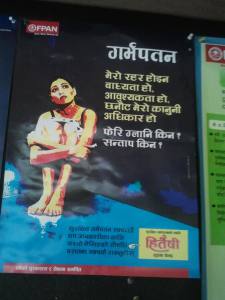
By Shreejana Bajracharya on Kumari, A Feminist
“I do not wish for abortion, but due to some circumstances it’s my need, to choose it is my right. Yet why I am puzzled, confused and remorseful?”
Whenever I represent Nepal as a youth delegate in any conferences or workshops I always share the great achievement Nepal’s government made in Women’s Health i.e. legalising abortion. For many years, women in Nepal had experienced strictest abortion laws in the world.
Do you know that in Nepal, to end unwanted pregnancies, women once endured illegal and unsafe abortions and were sentenced to lengthy prison terms for abortion-related “crimes”? At that time Nepal had one of the highest maternal mortality rates in Asia and there were more visits in health facilities for abortion related complications.
Well the Nepal government then made a remarkable change in law by legalizing abortion and offering abortion services in public hospitals in 2002. Three cheers for this, as women got safe choice to end unintended pregnancies in safe sites. The law has enabled women’s rights to control over and decide on their unintended pregnancies.
Abortion is legal in Nepal on the following grounds:
- Up to 12 weeks of gestation for any women,
- Up to 18 weeks of gestation if pregnancy results from rape or incest, and
- At any time during pregnancy, with the advice of a medical practitioner or if the physical or mental health or life of the pregnant woman is at risk or if the fetus is deformed and incompatible with life
Abortion is punishable on the following conditions:
- Sex selective abortion, and
- Abortion without the consent of the pregnant woman
Now I am proud to say that Nepal had won the MDG 5 award as Nepal has dramatically reduced the MMR from 539 per 10,000 live births in 2001 to 289 in 2006 and 281 in 2008. Legalisation of Abortion in Nepal in 2002 has contributed to this decline.
Young women below 16 years have one condition for seeking safe abortion service. The law says young women below 16 need consent from a guardian. Guardian has been described as not compulsorily parents; it might be sisters, brothers, uncle, aunts and a friend above 16 years. Even a service provider could be guardian if necessary.
Nepal believes “No woman should return without safe abortion service if she needs.”
Likewise, The Nepal National Abortion Policy 2002 guarantees access to safe and affordable abortion services to every woman without discrimination, while Safe Abortion Service Procedure 2003 defines clinical procedures for safe pregnancy termination, service provision facilities, client consent and lays down criteria for listing a health institution as Comprehensive Abortion Care (CAC) center.
This blog was originally published here on Aug 15, 2013